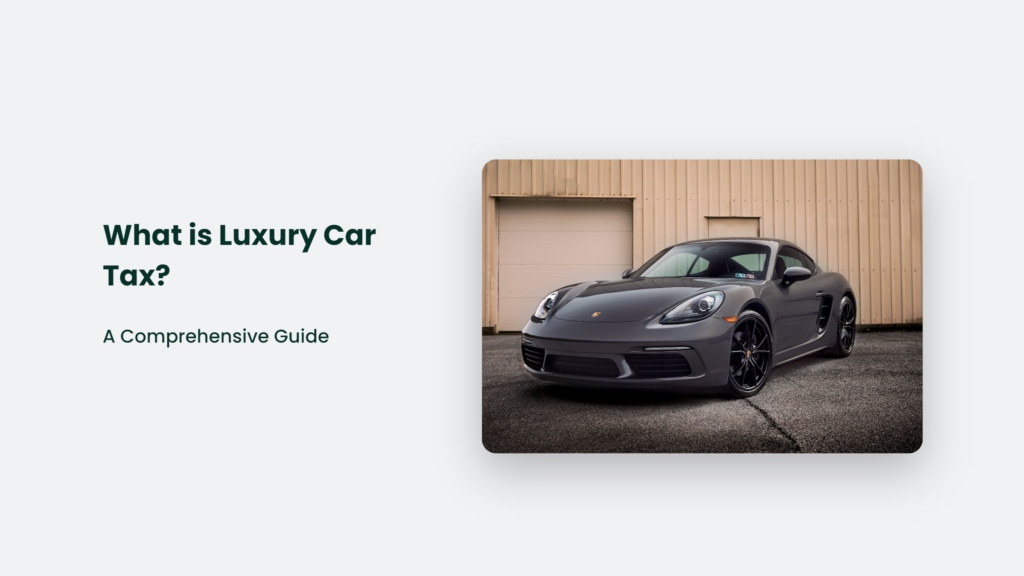

What is Luxury Car Tax in Australia?

As Seen On
Have you ever dreamt of driving a BMW, a Mercedes or a Porsche? Or perhaps you’re already lucky enough to own one of these luxurious vehicles. But have you ever heard of the Luxury Car Tax (LCT)? It’s a tax imposed by the Australian government on vehicles with a value above a certain threshold.

What is Luxury Car Tax?
The Luxury Car Tax was introduced in 2000 to ensure that luxury car owners pay their fair share of taxes. It applies to sales of two years old or fewer cars purchased from dealerships or private sellers. The tax also applies to imported vehicles and cars leased or hired out.
The amount of Luxury Car Tax payable depends on the retail price of the car and its fuel efficiency rating. Cars with higher fuel efficiency ratings have a higher LCT threshold than those with lower ratings.
The current threshold for the tax year 2022-2023 is $84,916 for fuel-efficient vehicles and $71,849 for other vehicles. If a car’s value exceeds this threshold, the LCT is calculated based on the value above the threshold and the tax rate currently 33%.
Example: If you purchase a car worth $80,000, you would be liable for 33% of the amount over $66,331 ($13,669). It means you would need to pay an additional $4,500 in Luxury Car Tax.
Luxury Car Tax Exemptions:

- Quoted ABN in Approved Format: If the recipient of the luxury car has quoted an ABN in the approved format, they may be exempt from paying the LCT.
- Car Manufactured More Than 2 Years Before Supply: If the car was manufactured more than 2 years before the supply, the recipient may be exempt from paying the LCT.
- Car Imported More Than 2 Years Before Supply: If the vehicle was imported more than 2 years before the supply, the recipient may be exempt from paying the LCT.
- GST-Free Export: If the car was exported as a GST-free export, the recipient may be exempt from paying the LCT.
- Emergency Vehicles: If the car is (or is intended to be) registered for use as an emergency vehicle, such as an ambulance, firefighting vehicle, police vehicle, or search and rescue vehicle, the recipient may be exempt from paying the LCT.
- Motor Homes and Commercial Vehicles: If the car is a motor home, campervan, or commercial vehicle designed mainly for carrying goods and not passengers, the recipient may be exempt from paying the LCT.
- Modifications for People with Disabilities: If the car has modifications for people with disabilities, the recipient may be exempt from paying the LCT.
- Already Paid LCT: If the recipient has already paid LCT on the value of the car, they may be exempt from paying it again.
- Endorsed Public Institutions: If an endorsed public institution, such as a museum, gallery, or library that is registered for GST and endorsed as a deductible gift recipient, either imports a car that is a work of art or collectors’ piece for the sole purpose of public display or sells a car that was purchased as a work of art or collectors’ piece for the sole purpose of public display to another endorsed public institution that also intends to use that car solely for public display, they may be exempt from paying the LCT.
In conclusion, there are several circumstances under which you may be exempt from paying the Luxury Car Tax in Australia. If you’re in the luxury car market, consider these exemptions to determine whether you may be eligible for a reduction or exemption from the LCT.
Frequently Asked Questions:
What is the Luxury Car Tax?
The Luxury Car Tax is a tax the Australian government imposes on vehicles with a value above a certain threshold. It is calculated based on the value above the threshold and the current tax rate.
How is the Luxury Car Tax calculated?
The Luxury Car Tax is calculated by subtracting the threshold from the value of the car, and then multiplying the taxable value by the tax rate.
Conclusion:
Overall, Luxury Car Tax is an important part of the Australian taxation system and helps ensure that luxury car owners pay their fair share of taxes. Knowing how much tax you’ll need to pay can help you budget accordingly when making large purchases such as cars.
Konger
Up until working with Casey, we had only had poor to mediocre experiences outsourcing work to agencies. Casey & the team at CJ&CO are the exception to the rule.
Communication was beyond great, his understanding of our vision was phenomenal, and instead of needing babysitting like the other agencies we worked with, he was not only completely dependable but also gave us sound suggestions on how to get better results, at the risk of us not needing him for the initial job we requested (absolute gem).
This has truly been the first time we worked with someone outside of our business that quickly grasped our vision, and that I could completely forget about and would still deliver above expectations.
I honestly can't wait to work in many more projects together!
Disclaimer
*The information this blog provides is for general informational purposes only and is not intended as financial or professional advice. The information may not reflect current developments and may be changed or updated without notice. Any opinions expressed on this blog are the author’s own and do not necessarily reflect the views of the author’s employer or any other organization. You should not act or rely on any information contained in this blog without first seeking the advice of a professional. No representation or warranty, express or implied, is made as to the accuracy or completeness of the information contained in this blog. The author and affiliated parties assume no liability for any errors or omissions.

